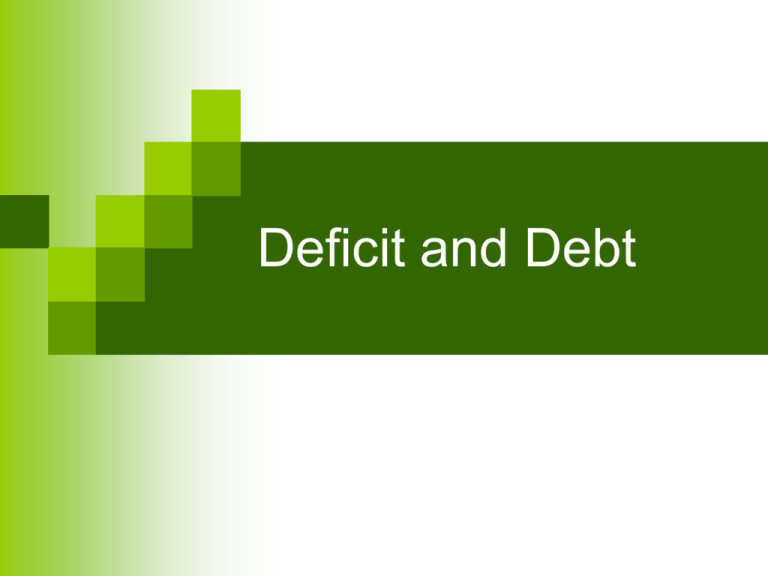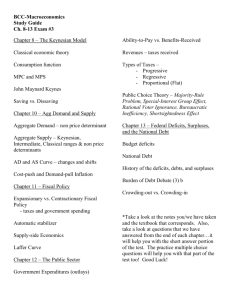
Deficit and Debt
Discretionary v. Automatic
Rules governing taxes and some transfers act as
automatic stabilizers, reducing the size of the
multiplier and automatically reducing the size of
fluctuations in the business cycle.
In contrast, discretionary fiscal policy arises
from deliberate actions by policy makers rather
than from the business cycle.
Discretionary Fiscal Policy
Making the Automatic Stabilizers More
Effective
Public
Works
The main fiscal policy to end the Depression
was public works
Transfer
Payments
The government could extend the benefit
period for unemployment compensation and
increase welfare payments, Social Security,
and veteran’s pensions
Copyright 2002 by The McGraw-Hill Companies, Inc. All rights reserved.
12-30
Discretionary Fiscal Policy
Making the Automatic Stabilizers More
Effective
Changes in Tax Rates
To fight inflation, the government can raise taxes
To fight recession, the government can cut taxes
Corporate incomes taxes can be raised during periods of
inflation and lowered when recessions occur
Using
tax rate changes as a counter cyclical
policy tool provides a quick fix, however,
temporary tax cuts carried out during recessions
should not become permanent
Copyright 2002 by The McGraw-Hill Companies, Inc. All rights reserved.
12-31
Discretionary Fiscal Policy
Making the Automatic Stabilizers More
Effective
Changes
in Government Spending
The government increases spending and cuts
taxes to fight recessions
The government decreases spending and
raises taxes to fight inflation
In brief, we fight recessions with budget
deficits and inflation with budget surpluses
Copyright 2002 by The McGraw-Hill Companies, Inc. All rights reserved.
12-32
Who Makes Fiscal Policy?
The President and Congress make
fiscal policy
This
is complicated and can be time
consuming, especially when one political
party controls Congress while the
president belongs to the other party
No one seems to be in charge of making
fiscal policy
Copyright 2002 by The McGraw-Hill Companies, Inc. All rights reserved.
12-33
The Deficit Dilemma**
Deficits, Surpluses, and the Balanced
Budget
When
government spending is greater
than tax revenue, we have a federal budget
deficit
The government borrows to make up the
difference
Deficits are prescribed to fight recession
Copyright 2002 by The McGraw-Hill Companies, Inc. All rights reserved.
12-35
The Deficit Dilemma
Deficits, Surpluses, and the Balanced
Budget
When
the budget is in a surplus position,
tax revenue is greater than government
spending
Budget surpluses are prescribed to fight
inflation
Copyright 2002 by The McGraw-Hill Companies, Inc. All rights reserved.
12-36
The Deficit Dilemma
Deficits, Surpluses, and the Balanced
Budget
We
have a balanced budget when
government expenditures are equal to
tax revenue
We’ve never had an exactly balanced
budget
Copyright 2002 by The McGraw-Hill Companies, Inc. All rights reserved.
12-37
The Deficit Dilemma
Deficits and Surpluses: The Record
The Federal Budget Deficit, Fiscal Years 1970-2001
Surpluses
Deficits
Copyright 2002 by The McGraw-Hill Companies, Inc. All rights reserved.
12-38
Why Are Large Deficits So
Bad?
Large deficits raise interest rates,
which, in turn, discourages investment
Our
real interest rate (the nominal interest
rate less the rate of inflation) during the
latter half of the 1980s and all of the 1990s
was three times a high as the real interest
rate in Japan’ and it was much higher than
those in most Western European countries
as well
Copyright 2002 by The McGraw-Hill Companies, Inc. All rights reserved.
12-39
Why Are Large Deficits So Bad?
The federal government has become
increasingly dependent on foreign
savers to finance the deficit
the early – and mid – 1990s
foreigners financed more than half the
deficit
In
Copyright 2002 by The McGraw-Hill Companies, Inc. All rights reserved.
12-40
Why Are Large Deficits So Bad?
Until the mid-1990s the deficit
sopped up more than half the
personal savings in this country,
making that much less savings
available to large corporate
borrowers seeking funds for new
plant and equipment
Copyright 2002 by The McGraw-Hill Companies, Inc. All rights reserved.
12-41
Why Are Large Deficits So Good?
On the positive side, budget deficits
stimulate the economy
The
only problem is that we should not
have needed this stimulus during the
“prosperous” mid-to late 1980s when
we were running huge deficits
We would do well to remember that
John Maynard Keynes would have
advocated running surpluses and
paying off the debt during periods of
prosperity
Copyright 2002 by The McGraw-Hill Companies, Inc. All rights reserved.
12-42
Will We Be Able to Balance Future
Budgets?
The federal government finally managed to run
a budget surplus in 1998
This
was the first time since 1969
The congressional Budget Office forecasts a
string of surpluses well into the new
millennium
Congressional
Republicans and Democrats quickly
proposed dueling plans to dispose of those
surpluses with various combinations of tax cuts and
spending increases
No elected official proposed slowing down the
projected increases in Social Security spending
Copyright 2002 by The McGraw-Hill Companies, Inc. All rights reserved.
12-43
Will We Be Able to Balance Future
Budgets?
A recession, a decline in stock prices, a
tax cut, or an increase in government
spending programs can easily eliminate
any surpluses and replace them with
deficits
Copyright 2002 by The McGraw-Hill Companies, Inc. All rights reserved.
12-44
After the year 2015, as the baby boom
generation attains senior citizenship,
the Social Security Trust Fund will be
quickly depleted
Unless
the government has already raised
Social Security taxes or cut benefits, the
federal budget surplus will quickly become
a large and growing deficit
The Proposed Balanced Budget
Amendment and the Line Item Veto
Must we balance the budget each year?
The
government really tried to balance the
budget each year into the early 1930s
The economic wisdom today tells us that
we should have deficits in lean years and
surpluses in fat years
From 1961 through 1997 the government
managed only one surplus
The national debt rose every year as we ran
budget deficits in fat years
Copyright 2002 by The McGraw-Hill Companies, Inc. All rights reserved.
12-45
The Proposed Balanced Budget
Amendment and the Line Item Veto
The first step in passing a
Constitutional amendment to balance
the budget is a two-thirds vote in
both houses of Congress
Despite
some very close votes in 1994,
1995, 1996, and 1997, the balanced
budget amendment failed in one or the
other houses of Congress
Most economists oppose such an
amendment because it would put us in
an economic straitjacket
Copyright 2002 by The McGraw-Hill Companies, Inc. All rights reserved.
12-46
Should the Budget be
Balanced?
Most economists don’t believe the
government should be forced to run a
balanced budget every year because this
would undermine the role of taxes and
transfers as automatic stabilizers.
Yet policy makers concerned about
excessive deficits sometimes feel that rigid
rules prohibiting—or at least setting an
upper limit on—deficits are necessary.
The Federal Budget Deficit & The Business
Cycle
The budget deficit as a percentage of GDP tends
to rise during recessions (indicated by shaded
areas) and fall during expansions.
These Deficits
help end the
recessions
Defining Surpluses and Debt
A surplus is an excess of revenues over
payments.
A deficit is a shortfall of revenues over
payments.
The Definition of Debt and
Assets
Debt is accumulated deficits minus
accumulated surpluses.
Deficits and surpluses are flow concepts.
Debt is a stock concept.
Long-Run Implications
U.S. government budget accounting
is calculated on the basis of fiscal
years.
Persistent budget deficits have longrun consequences because they lead
to an increase in public debt.
A String of Deficits
Budget Surpluses
Budget Deficits
1970 19721974 19761978 1980 1982 19841986 1988 19901992 1994 1996 1998 2000 2002
The U.S. Government Has Always
Been in Debt Except
1835-36: Debt Free! – The U.S. was
completely out of debt by 1835.
The Mexican-American War (1846-48)
caused a four-fold increase in the debt
The Public Debt
Differentiating between the Deficit and
the Debt
The
deficit occurs when federal government
spending is greater than tax revenue
The debt is the cumulative total of all the federal
budget deficits less any surpluses
Suppose that our deficit declined one year from $200
billion to $150 billion
The national debt would still go up by $150 billion
So every year that we have a deficit – even a declining
one – the national debt will go up
Copyright 2002 by The McGraw-Hill Companies, Inc. All rights reserved.
12-48
The Public Debt
National Debt, 1975-2000
6
5
4
3
2
1
0
1976
1978
1980
1982
1984
1986
1988
1990
1992
1994
1996
1998
2000
Economic Report of the President, 2000
Copyright 2002 by The McGraw-Hill Companies, Inc. All rights reserved.
12-49
The Public Debt
Who holds the national debt?
Private American
citizens hold a little less than
half
Foreigners hold almost one-third
The rest is held by banks, other business
firms, and U.S. government agencies
Copyright 2002 by The McGraw-Hill Companies, Inc. All rights reserved.
12-50
Who do we owe?
Public Debt is government debt held by
individual and institutions outside the
government.
Big part of the Government debt is owned
by the Government!
It
owes money to itself?
Debt
Foreign
individuals and
firms (25%)
U.S.
government
agencies (42%)
U.S. individuals
and firms (24%)
Federal Reserve
(9%)
© 2004 The McGraw-Hill Companies, Inc., All Rights Reserved.
Debt Burden
Is the national debt a burden that will
have to borne by future generations?
As
long as we owe it to ourselves, the
answer is no
If we did owe it mainly to foreigners, and if
they wanted it paid off, it could be a great
burden
Difference Between Individual and
Government Debt***
Paying interest on the internal debt
involves a redistribution among citizens of
the country.
It does not involves a net reduction in
income of the average citizen.
Difference Between Individual and
Government Debt**
External debt is more like an individual’s
debt.
External debt – government debt owed
to individuals in foreign countries.
The Public Debt
When do we have to pay off the debt?
We
don’t. All we have to do is roll it over, or
refinance it, as it falls due
Each year several hundred billion dollars worth of
federal securities fall due
By selling new ones, the Treasury keeps us going
In
the future, even if we never pay back one penny
of the debt, our children and our grandchildren will
have to pay hundreds of billions of dollars in
interest
At least to that degree, the public debt will be a burden to
future generations
Copyright 2002 by The McGraw-Hill Companies, Inc. All rights reserved.
12-51
Debt and Our Children
In
the future, even if we never pay back
one penny of the debt, our children and
our grandchildren will have to pay
hundreds of billions of dollars in interest
At least to that degree, the public debt will be a
burden to future generations
Interest Rates and Debt Burden
The interest rate determines annual debt
service.
The annual debt service is the interest
rate on debt times the total debt.
Interest Rates and Debt Burden
Interest payments on the debt is
government revenue that cannot be spent
on defense or welfare.
That is what people mean when they say a
deficit is burdening future generations.*
The Public Debt
Why not go ahead and just pay off the debt?
Economists
predict that following this course would
have catastrophic consequences
If we tried to pay off the debt too quickly, it might
even send us into a deep depression
If we keep running large surpluses and pay down the
national debt, this will cause a problem for both the
Social Security Trust Fund and the Federal Reserve
As the national debt goes down, eventually there would be
no securities for them to buy
Still, it is a whole lot better to have problems like these than
those caused by running huge budget deficits every year






